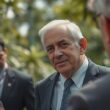SPD’s Dirk Wiese Welcomes Bamf’s Decision to Halt Asylum Decisions for Syrians
Dirk Wiese, the SPD’s faction leader, has welcomed the announcement by the Federal Office for Migration and Refugees (Bamf) to temporarily halt all asylum decisions for Syrian citizens. “I welcome the decision by the Federal Office for Migration and Refugees to put on hold all pending asylum applications from Syrian citizens for the time being,” Wiese told T-Online on Monday.
At the same time, Wiese criticized hasty advice and demands to speed up the return of refugees to Syria, calling it “nothing but populism and out of place in the current unclear situation.” Several CSU politicians had previously made such demands.
FDP’s Konstantin Kuhle, on the other hand, urged Germany to work with its allies to establish a stable order in Syria, to prevent a new large-scale refugee movement. “It’s too early to draw concrete conclusions about the rights of Syrian citizens in Germany,” Kuhle told T-Online.
Green’s migration expert, Filiz Polat, warned against hasty conclusions for Germany. “Now is the time for relief and restraint,” she said to T-Online. “We should wait and see the further development and support a peaceful transition. Then, there will be a long-term perspective for all people in Syria, which would also mean a reduction in refugee movements to Europe and Germany.”
AfD’s Alice Weidel, however, called on Syrian refugees to return to their homeland after the fall of the Assad regime. “It’s clear that the flight reason will no longer apply for many people from Syria, especially those who claimed to be persecuted by the former regime,” Weidel told the “Stern.” The government should contact neighboring states that support the current situation and discuss the return of these individuals.
Similar views were expressed by Sahra Wagenknecht, the leader of the Left, who said, “I expect those who here cheer on the Islamist takeover in Syria to return to their homeland as soon as possible.” She also warned of a new refugee wave, stating that “many signs indicate that Syria is developing into a new Islamic republic.”
Wagenknecht further urged the government to protect the laicist part of the Syrian society, including girls and women, Alawites, Christians, Kurds, Armenians, and other minorities, from persecution and oppression by the new power holders, which could force them to flee.
In a similar vein, Weidel emphasized that the situation in Syria is “far from stable,” and the government should maintain contact with states that view the new system in Syria as a threat, as a new refugee wave in the region could be detrimental to the interests of both the region and Europe.





